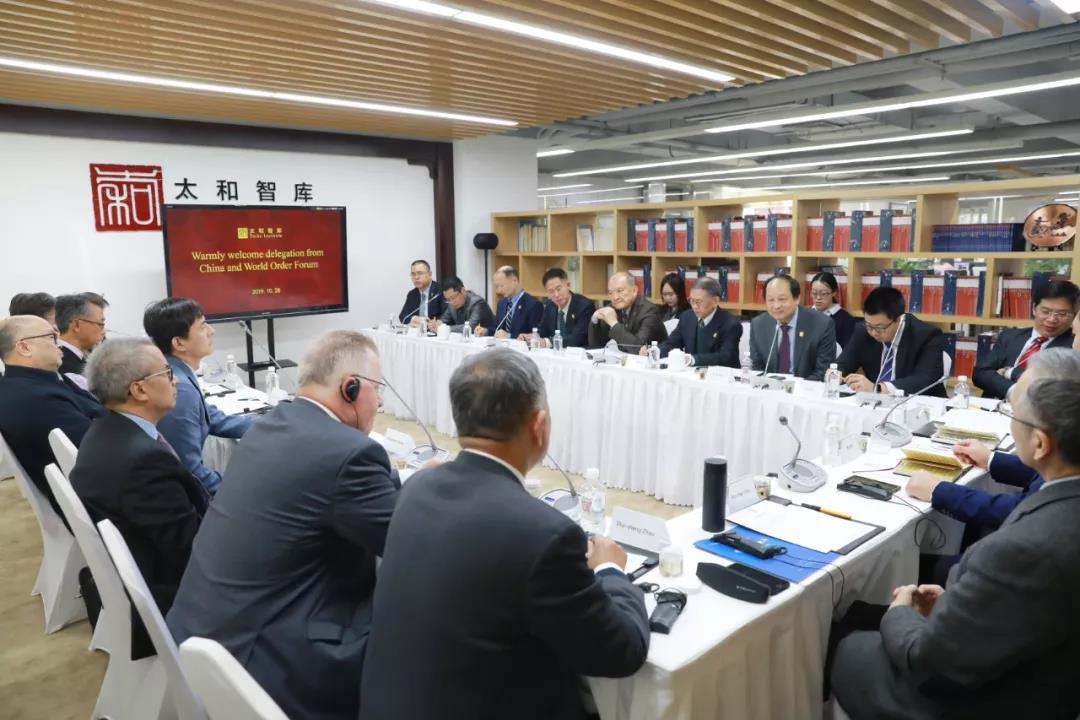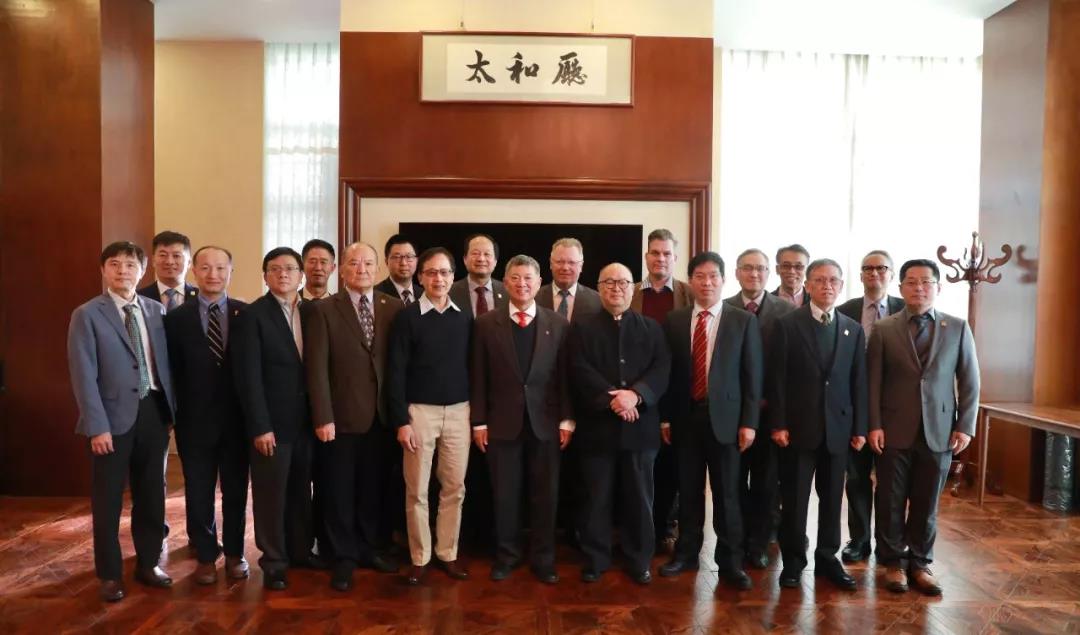On October 28th 2019, a delegation of scholars from the “China and World Order Forum” visited Taihe Institute. Academics from the United States, Canada, Germany, New Zealand, Singapore, Hong Kong and Taiwan, China and researchers from Taihe Insitute shared their thoughts on topics including “the U.S. Presidential Election and Sino-US Competition”, “the impact of the Sino-US Trade War on the global economy and globalization”, and “how can Asian and European countries cope with the difficulties caused by the Sino-US Trade War”.
Symposium Scene
With the competitive side of China-US relations increasingly prominent, China will undoubtedly appear as an important issue in the US election campaign in 2020. Both the Democratic Party and the Republican Party will largely retain a tough policy towards China, no matter which one wins the election. Being tough with China has become a common consensus among the American elite. Nowadays, “Doves” towards China-related issues have become fairly rare, and the debate on China policy is mainly between "moderate hawks" and "super hawks". These disputes only differ in the degree of toughness and the methods.
Both China and the United States have been beneficiaries of globalization. There will be no winners in the Sino-US Trade War. Currently, there is still a dispute between China and the United States as to who depends more on whom in terms of economy and trade, and who is hurt more by the Trade War. However, there is no doubt that the United States has greatly underestimated the endurance of China’s economy and overestimated the substitutability of China's exports to the United States. To a certain extent the sensitivity of America’s policy towards China indicates its lack of self-confidence. Sino-US relations are in a downward spiral, and a certain kind of “New Cold War” is upon us. China strives for a “win-win” situation, and if the United States realizes China’s harmonious values and dispels Cold War mentality, China and the U.S. could jointly become an important force for sustaining world prosperity. China and the United States need to strengthen mutual communication and understanding, dispel concerns and focus on solving their own domestic issues.
The United States insists that China “benefits more” from the global economic system as well as Sino-US trade relations, and that China is “not equally open” towards America, which is the major drive of the Sino-US Trade War initiated by the Trump administration. Nevertheless, the Trade War with China initiated by the United States lacks rationally scientific and theoretical support, reflecting the lack of understanding of China's political and economic resilience and its will to resist external pressure. Meanwhile, the U.S. has also underestimated the constraints placed by globalization on “economic nationalism”. There is no future for the Trump administration in launching a “Technology War” towards China. The foundation and premise of the assertion that “science and technology are the primary productive forces” is the needs of the market and society. The Sino-US Trade War and Technology War will prevent the U.S. from achieving the maximum benefit from its technological and economic performance. On the contrary, the conduct of the U.S. will help facilitate China’s technological independence, and result in its losing the Chinese market, which is not conducive to America’s long-term interests.
Multilateralism is still an option to resolve disputes around the Sino-US Trade War. Anti-globalization is unimaginable. Meanwhile, countries all over the world should resolve disputes through multilateral mechanisms. The Trade War will not only have a negative impact on the economy, but also affect politics, security and even the future development of the world. Therefore, cooperation and coordination between major countries around the world in fields including economy, politics, and security is of great importance.
Europe is facing a dilemma in the Sino-US confrontation. Although trade cooperation between China and Europe has become increasingly strong, European countries, especially Germany, are criticizing China on issues such as human rights and trade. On the other hand, the common values normally shared by Europe and the United States have begun to collapse. Besides, Europe can never completely rely in future on Transatlantic Relations faced by blackmail and intimidation from the U.S.. In this condition, there is no doubt that Europe is facing a difficult multi-faceted question. Therefore, Europe prefers to see China and the U.S. resolving the issues of mutual distrust, and mitigating their competition over trade, security and technology. As for the relationship between China and Europe, the issue of strengthening the understanding and trust of European political elites and corporations towards China in the process of promoting the “Belt and Road” Initiative will be a key issue for discussion in the future.
China is now playing an increasingly important role in the world arena by supplementing and improving multilateral mechanisms. Many countries, including Canada, do not want to take sides between China and the U.S.. The international community must take into account the influence exerted by developing countries like China, Brazil and India on the global landscape, and should intensify the international order based on rules. And China will definitely become a major beneficiary in this process.
The ASEAN countries are expecting Sino-US relations to remain “competitive but non-confrontational”. Although ASEAN countries have limited influence on the future direction of Sino-US relations, they can still stay neutral and promote multilevel, multichannel interaction and communication between China and the U.S. by utilizing ASEAN-centred multilateral mechanisms and mitigate the situation of Sino-US confrontation to some extent. Although ASEAN countries would never welcome an escalation of the conflict between China and the US, they can only adapt to the situation in the condition of limited means. Considering geopolitical factors, most Southeastern Asian countries are more likely to choose to develop closer relationships with China to some extent, if it comes to extreme choices.
At present, Sino-US relations are still in a transitional stage from old to new patterns. China and the U.S. could either both benefit from cooperation, or endure the losses caused by confrontation. The future trend of Sino-US relations development relies on China and the U.S. themselves, but it will also be influenced by the global environment as well as other variables in the international system. Taihe Institute will constantly strengthen its research and academic exchanges in the field of Sino-US relations, and will contribute its wisdom and efforts to the sound development in Sino-US relations and the promotion of bilateral mutual trust between the two countries.
Group Photo of the Participants
—————————————————————
ON TIMES WE FOCUS.
Should you have any questions, please contact us at public@taiheglobal.org

